#dialectical behaviour therapy
Text
You don’t build psychological resilience by feeling good all the time. You build psychological resilience by getting good at feeling bad.
Mark Manson
#Mark Manson#markmanson#resilience#emotional resilience#psychological resilience#emotions#feelings#emotional regulation#strength#emotional intelligence#therapy#personal growth#self help#coping with emotions#self regulation#dbt#dialectical behaviour therapy#exposure therapy
730 notes
·
View notes
Text

#this is such a valuable list to help people explore their feelings#emotions#mental health#DBT#dbt skills#dialectical behaviour therapy#dialectical behavior therapy#triggers#triggered#trigger
209 notes
·
View notes
Photo

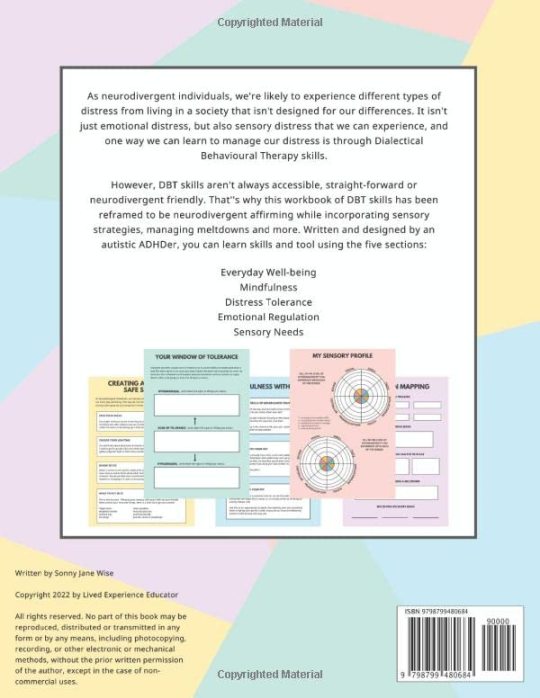
Question: Does anyone have experience with this workbook so far?
I’m thinking of buying it someday as I’m neurodivergent but it’s price is driving me away as the amount of pages in the workbook are quite little. € 24,85 for only 79 pages is something that makes me feel like I’m being ripped off to be fair, but I don’t want to sound mean...
It looks really good but the price to page ratio is just making me very unsure. I also found out it has spelling mistakes so,,, idk. Calling Marsha Linehan “Marsha Lineham” is kinda funny but also like WHOOPS.
For those that didn’t know this book existed: I found it on amazon! If you don’t have worries about money feel free to buy this book and tell us about it bc I really want to know what it’s truly like.
#dbt#dbt skills#dbtumblr#dialectical behavior therapy#dialectical behaviour therapy#marsha m linehan#marsha linehan#actually neurodivergent#neurodivergency#bpd#borderline personality disorder#actuallybpd#actuallyautistic#actually adhd#adhd#autism
23 notes
·
View notes
Text
Here Are The Multiple Benefits Of DBT

Certain approaches to mental health care focus exclusively on either the positive or the negative aspects of an individual's illness. Dialectical behaviour therapy, on the other hand, takes an entirely unique approach to treating patients. This is due to the fact that DBT gives equal weight to the positives and drawbacks that both groups have to offer. If a person does not believe they are able to successfully complete their online therapy on their own, they have the option to book sessions with industry-leading service providers such as Online DBT.
Its relevance of it can be seen in the following particulars.
Helps with relapse and triggers
Therapists may use DBT therapy to help people modify their decision-making techniques and repair their self-image while learning to identify triggers and avoid relapse situations. DBT is an excellent therapeutic choice for individuals who need to practice and master the art of saying no to stimuli and temptations. This therapy aids patients in looking at their fundamental causes of stress and providing them with coping skills so that they can look at stressful events from a new vantage point.
Has short and long-term benefits
The most important feature of a DBT therapy is that it is a long-term solution rather than a short-term one. DBT focuses on the underlying causes of substance use and offers people the opportunity to gain insight into triggers, self-confidence, and self-awareness so they can get the assistance they need to succeed if a difficult situation arises. Individuals who are addicted to alcohol or other drugs need as many resources and tools available to assist them in continuing their rehabilitation path. DBT is one of the most effective methods for assisting people in moving forward and maintaining a drug-free lifestyle with optimism and support.
Better understand your emotions and thoughts
DBT is a form of cognitive behavioural therapy that aims to help patients cope with emotional turmoil and symptoms. DBT uses dialectics (dialogue) to work through past traumas and current problems. You become aware of the intricate feelings and mental structures that influence your actions and decisions while undergoing DBT therapy. You become more mindful as a result of DBT, allowing you to stay present at the moment while paying attention to others around you and your current situation.
Improve your relationships with yourself and others
DBT therapies help patients improve their self-esteem and interpersonal relationships. DBT treatment encourages you to comprehend and accept yourself as a complex individual. It's critical to recognise your potential and ability to get better mental health. When you can accept yourself and take responsibility for your actions, you'll be able to stop blaming others. How could breaking out of the good/bad, friend/enemy binary thinking, as well as increased patience, tolerance, and compassion, benefit your relationships?
Resolve "all-or-nothing" thinking
Acceptance of oneself as one is and being open to beneficial change are two aspects of DBT. That means letting go of "all-or-nothing" thinking. Instead then reacting to distressing, extremely negative ideas and sentiments in the present, you can learn to sit with discomfort and regulate your emotions by starting to control them.
Builds interpersonal skills
Mental health difficulties frequently get in the way of healthy connections. To all people, however, successful, mutually-assistive relationships are essential. People who are battling mental illness require support networks to lean on. As a result, DBT attempts to construct important interpersonal DBT skills that individuals can utilise to repair or restore any harm done to their valued relationships. In addition, DBT provides patients with methods for improving their self-advocacy skills so they may set appropriate boundaries and develop trust.
Develops life skills
The main aim of DBT is to help individuals with mental illness. However, the DBT skills acquired throughout sessions may also be applied to everyday life. Mindfulness, for example, is a central tenet of DBT. People who practice mindfulness on a regular basis appear to have better general health and well-being. One advantage of DBT is that patients improve their mental health. They will also learn abilities that can help them live a healthier life in general.
Helps balance emotions
Acceptance of circumstances is another key component of DBT. That does not, however, imply that people should feel powerless in their situations or must just live with the hand they've been dealt. It does imply that DBT provides individuals with the tools to manage their mental health.
Particularly noteworthy are individualized treatment programs that are derived from DBT. Reliable teams are always ready and willing to make adjustments to the treatment strategy in response to any changes in the conditions. Pick the ones that have goals that are both easy to understand and within reach. The most trustworthy ones offer up-to-date information about their progress on a regular basis.
#DBT#DBT therapy#DBT skills#DBT therapy near me#DBT training#DBT therapy UK#dialectical behaviour therapy#private DBT therapy#DBT for BPD#DBT therapy London
4 notes
·
View notes
Text
Mastering Emotional Resilience: The Power of Dialectical Behaviour Therapy Online
Dialectical Behaviour Therapy (DBT) Course Online is a comprehensive training program designed to equip mental health professionals with the knowledge and skills needed to effectively treat individuals with complex emotional dysregulation. The course incorporates evidence-based practices and strategies aimed at helping individuals to regulate their emotions, develop effective coping mechanisms, and improve interpersonal relationship skills. The program features a library of over 450 courses, providing staff members with access to engaging learning materials that are compatible with all major browsers and devices. The courses range from micro-learning video lessons to full courses, with up to 40 hours of content.Here is the course link:https://lead-academy.org/course/dialectical-behaviour-therapy

0 notes
Text
I've lost my path again, but at least I can recognise that and I know how to get back on track. It's clear that work stress and relationship stress are my two biggest triggers. That's important information to have. I can't change either - the stress isn't going to decrease for either - so I need to instead find a way to adjust my response.
I'm reading through both the books - DBT for Emotional Eating and also Overcoming Binge Eating. I'm looking at the tricks they suggest.
The two weeks I successfully completed on my set nutrition plan were so good. I stopped drinking. I ate healthy. My weight dropped quickly to a still curvy but healthier look - just in two weeks. I'm always going to be a curvy girl (no more starving myself) but I felt so good in my skin. I felt healthy and confident. The work stress and relationship stress were both still there though.
Today I'd like to work how I will approach this going forward. Tactics that I know work are exercise and study, but I don't always have the energy for either. I don't meditate anymore, but maybe I should? I like to walk in the park, but I stopped without any real reason. That could also break it up. Sometimes sorting through the clothes I wish still fit can motivate me a little. I need to also focus on remembering how awful my body feels right now - sluggish, heavy, and like there's just too much of it.
This has been a setback but I can also see how I've gained valuable information here. Reminding myself of that. Also, that today is a new day and so far I've achieved everything I set out to do. Leaving the perceived failures from yesterday behind.
#DBT#dialectical behaviour therapy#dialectical behavior therapy#emotional eating#emotion mind#emotional regulation#overcoming binge eating#dbt for emotional eating#ed recovery#healing#health
0 notes
Text
I'm grateful for the opportunity to try again tomorrow
1 note
·
View note
Text
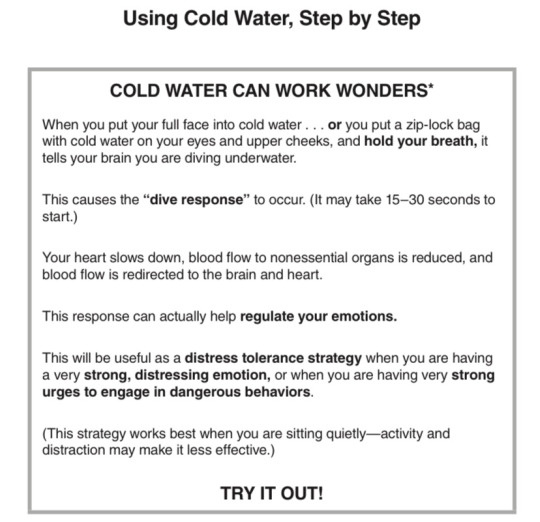
this and a blunt
98 notes
·
View notes
Text

bellalovecoach ~ Instagram
#Bella Love Coach#self soothing#emotional regulation#self regulation#coping strategies#self care#coping with emotions#dbt#dialectical behaviour therapy#dialectical behavior therapy#therapy#mindfulness#breath work#aromatherapy#recovery#healing#grief#breakup#heartbreak#personal growth#personal development#self help
36 notes
·
View notes
Text
GIVE Skills: For Keeping A Relationship
G: be Gentle! No attacks. Remember to be nice and treat this person you care about with respect.
I: act Interested. Listen to what it is they’re really saying. Don’t try to read your own meaning or let Emotion Mind give you tunnel vision.
V: Validate. Whatever they’re feeling is as real as what you’re feeling. Let them know that.
E: use an Easy manner. Remember you care about this person; this is no time for attitude or demands.

#give#give skills#dbt#dbt skills#dialectical behaviour therapy#dialectical behavior therapy#therapy#reminders#therapy homework
2 notes
·
View notes
Photo
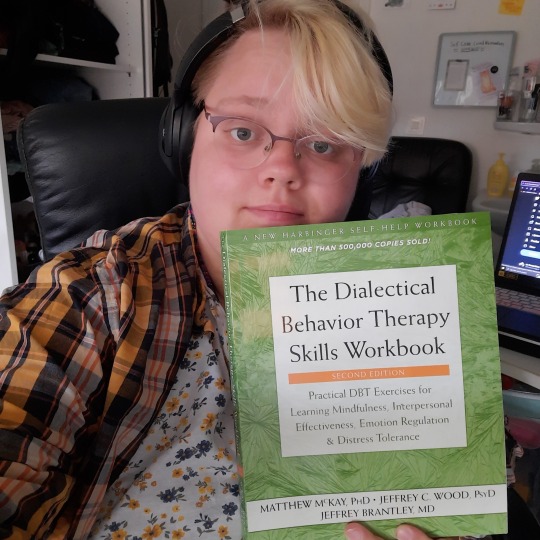
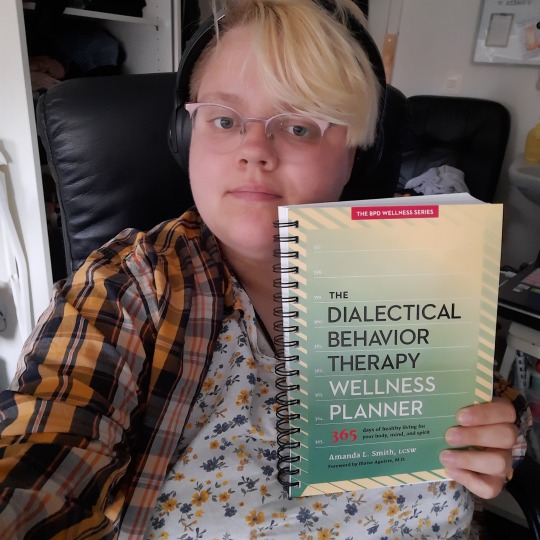
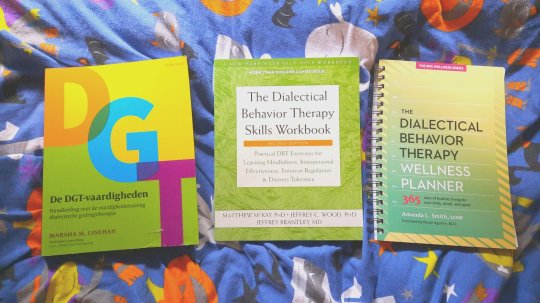
Very excited to be working on my DBT skills again : )
I got my two new DBT books in a few days ago, and I’ve already started with the DBT skills workbook. The Wellness Planner I’ll start tomorrow (monday) and the Dutch DGT-vaardigheden book was my original book that I used during my actual treatment.
My actual goal is to collect more DBT content:
- DBT Skills Training Manual by
Marsha M. Linehan
- DBT Skills Training Handouts and Worksheets, Second Edition by Marsha M. Linehan
- Dialectical Behavior Therapy Diary: Monitoring Your Emotional Regulation Day by Day by Matthew McKay and Jeffrey C. Wood
- Mindfulness for Borderline Personality Disorder by Blaise Aguirre
Dutch books:
- De DGT-Vaardigheden Werkboeken by Marsha M. Linehan
- Omgaan Met Overweldigende Emoties by Matthew McKay and Jeffrey C. Wood
Why would I ever want to learn DBT in English when I finished treatment in Dutch? Because I think it’s interesting to learn it in English, as well as I think I can help more people by knowing everything in English. I also just think it’s fun, the differences between the languages and the way skills are called is really interesting.
#dbt skills#dbt therapy#dbt#dbtumblr#dialectical behavior therapy#dialectical behaviour therapy#actuallybpd#marsha m linehan#lucas.png
11 notes
·
View notes
Text
developing emotional regulation and coping skills is so easy until you have emotions
3 notes
·
View notes
Text
Different Types of Psychotherapies: Exploring Your Options | Solh Wellness
Several psychological therapies provide useful strategies for overcoming life's problems when it comes to improving your mental health. These treatments, often known as talk therapies or psychotherapies, offer a framework for comprehending and controlling your ideas, feelings, and behaviors.

Let's look at the various forms of psychological therapy available:
Cognitive Behavioural Therapy (CBT)
A well-known treatment method called cognitive behavioral therapy (CBT) aims to recognize and alter unfavorable thought patterns. By recognizing and addressing these ideas, people can manage disorders like anxiety, melancholy, and stress efficiently. Through CBT, you acquire practical abilities to change your negative thinking.
Dialectical Behavioural Therapy (DBT)
DBT combines techniques that encourage mindfulness with cognitive behavioral treatment. Those who struggle with strong emotions, risky behavior, and interpersonal problems benefit the most from it. DBT teaches individuals how to control their feelings, strengthen interpersonal bonds, and encourage self-acceptance.
Psychodynamic Therapy
This therapy focuses mostly on the unsolved problems and unconscious mechanisms that influence your ideas and behaviour. To uncover ingrained patterns and advance consciousness and personal development, psychodynamic therapy digs into past interactions and experiences.
Acceptance and Commitment Therapy (ACT)
ACT places a strong focus on accepting one's ideas and feelings as opposed to trying to repress them. It helps people define their values and make a commitment to upholding them. This therapy effectively treats anxiety while enhancing general wellbeing.
Mindfulness-Based Therapies
Self-awareness and present-moment awareness are encouraged in therapies that place a strong emphasis on mindfulness. These therapies include:
Mindfulness-Based Stress Reduction (MBSR):Through the practice of moderate yoga and mindfulness meditation, MBSR aims to reduce stress and promote emotional control.
Mindfulness-Based Cognitive Therapy (MBCT): Since the MBCT program combines cognitive therapy techniques with mindfulness training, it can benefit people who have recurrent depression.
Humanistic Therapies
The goals of humanistic therapies are the pursuit of self-actualization, self-growth, and self-discovery. These consist of:
Person-Centred Therapy: In the encouraging, nonjudgmental environment of this treatment, people can examine their thoughts, feelings, and experiences.
Gestalt Therapy: The value of fully experiencing the present moment is emphasized by gestalt therapy. It promotes self-awareness and accountability.
Family Systems Therapy
Understanding how a person's ties with their family impact their mental health is the aim of family systems therapy. It tries to promote harmony within the family and communication.
Interpersonal Therapy (IPT)
In IPT, emphasis is placed on interpersonal and communication skills. Both treating depression and resolving interpersonal conflicts can be done using it.
Narrative Therapy
Examining the narratives we tell about our lives is an essential component of narrative therapy. Retelling and recreating these tales can offer people fresh perspective and a sense of empowerment.
Behavioural Therapy
Behavioral therapy seeks to alter a behavior by identifying the reinforcers of that behavior. For phobias, OCD, and other conditions, there are two methods of treatment: behavior modification and exposure therapy.
Last but not least, each therapy has its unique technique and benefits. A licensed therapist can help you discuss your options and help you discover the option that best suits your needs. Remember that choosing the ideal approach could need some trial and error because therapy is a collaborative process. By incorporating psychological treatment into your regular routine for maintaining your mental health, you may offer yourself the resources you require to live a more balanced and fulfilling life.
At Solh Wellness, we take great care to fully understand the range of mental health issues and offer treatment that is uniquely tailored to each potential client. Our therapists are skilled at adapting the course of treatment to meet the demands of the patients. In order to assist you practice mindfulness and self-care, we also provide resources and techniques.
#Cognitive Behavioural Therapy#Dialectical Behavioural Therapy#Humanistic Therapies#Narrative Therapy#Interpersonal Therapy#Family Systems Therapy#Acceptance And Commitment Therapy
3 notes
·
View notes
Text
Mastering Life's Ups & Downs with Dialectical Behaviour Therapy (DBT)
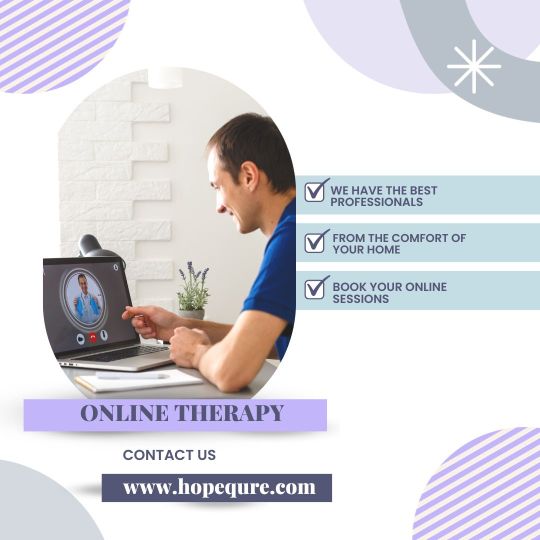
🌟 Welcome to Hopequre🌈, your transformative journey towards emotional well-being using Dialectical Behaviour Therapy (DBT)! 🌟
Are you ready to navigate life's twists and turns with resilience and grace? 🔄 Our online DBT program is designed to empower you with the skills and insights needed to harmonize your emotions, enhance relationships, and cultivate a life of balance and fulfilment. 🌺
🧘♀️ What is DBT?
Dialectical Behaviour Therapy is an evidence-based therapeutic approach that combines cognitive-behavioral techniques with mindfulness practices. Developed to address emotional dysregulation, DBT equips individuals with practical tools to manage stress, regulate emotions, and build healthier connections.
🌈 Why "Hopequre"?
Our program focuses on embracing the dialectics of life – the coexistence of opposites. 🤝 We believe in the power of balance, where acceptance and change coalesce to create a life of authenticity and purpose. Through live sessions, interactive modules, and a supportive community, you'll embark on a journey of self-discovery and growth.
🚀 What to Expect:
🌟 Mindfulness Mastery: Learn mindfulness practices to stay present and cultivate awareness in your daily life.
🤹♀️ Emotion Regulation: Gain strategies to manage intense emotions and navigate the ups and downs effectively.
👫 Interpersonal Effectiveness: Enhance your communication skills and build meaningful connections with others.
🌱 Distress Tolerance: Develop resilience in facing life's challenges with practical coping mechanisms.
👩💻 How it Works:
Participate from the comfort of your home through our user-friendly online platform. Engage in live sessions with our experienced DBT therapists, access downloadable resources, and join a supportive community where you can share your progress and insights.
🌟 Invest in Yourself:
"Hopequre" is not just a program; it's an investment in your well-being and personal growth. Take the first step towards a more balanced and fulfilling life – because you deserve it!
🎉 Join us on this transformative journey! Enrol now and unlock the power of DBT to Hopequre in every aspect of your life! 🚀🌟
0 notes
Text
De-Addiction Center in Delhi: Reclaim Your Life with Ananda Care

Welcome to Ananda Care, where holistic healing meets cutting-edge rehabilitation. Our commitment is unwavering, providing a comprehensive approach to recovery that sets us apart from the rest. Anand Care Rehab offers an unparalleled world of facilities, treatments, and therapies that exceed expectations and redefine the standards of care. We at Anand Care believe in not just treating the symptoms but addressing the root cause of addiction, providing a holistic and sustainable path to recovery.
Ananda Care believes in the power of holistic healing. Our therapy programs extend beyond traditional methods, incorporating elements such as yoga, mindfulness, and art therapy. Our commitment to excellence is evident in our use of evidence-based treatments. From CBT to DBT, we integrate scientifically proven methods to ensure the highest quality of care. Ananda Care stays at the forefront of advancements in addiction treatment, offering the latest and most effective interventions available.
#de-addiction center in delhi ncr#addiction treatment in new delhi#best addiction treatments in india#drug addiction treatment in delhi ncr#relapse prevention treatment in delhi#cognitive behavioural therapy in delhi#dialectical behavioural therapy in delhi
1 note
·
View note
Text
that said i think wz was right to be going around torturing people. he’s seventeen so you know what sort of insanity that brings upon a man.
0 notes